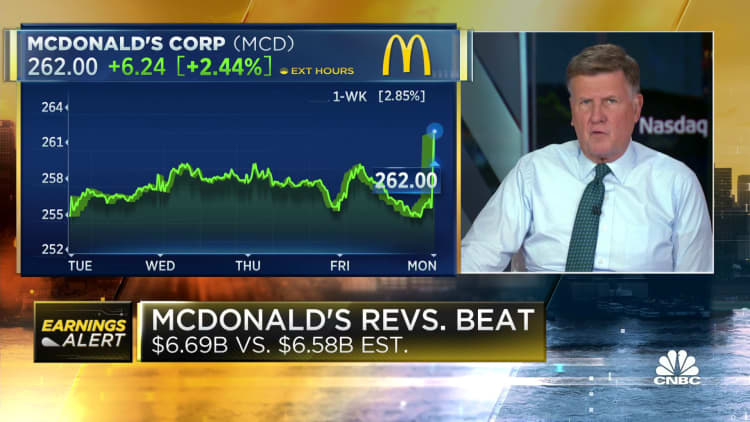McDonald’s revenue climbs 14% as price hikes boost U.S. sales

[ad_1]

McDonald’s on Monday reported quarterly earnings and revenue that beat analysts’ expectations as price hikes offset falling traffic to its U.S. restaurants.
Despite higher menu prices in some regions, executives said that the burger chain is still beating rivals across most of its biggest markets when it comes to consumers’ perception of value and affordability.
“It’s clear that our customers continue to seek reasonably priced meals as rising costs persist, and our markets around the world continue to respond,” CFO Ian Borden told analysts on the company’s conference call.
Shares of the company closed up 1.7% on Monday.
Here’s what the company reported compared with what Wall Street was expecting, based on a survey of analysts by LSEG, formerly known as Refinitiv:
- Earnings per share: $3.19 adjusted vs. $3 expected
- Revenue: $6.69 billion vs. $6.58 billion expected
The fast-good giant reported third-quarter net income of $2.32 billion, or $3.17 per share, up from $1.98 billion, or $2.68 per share, a year earlier.
Excluding items, McDonald’s earned $3.19 per share.
McDonald’s revenue rose 14% to $6.69 billion. Global same-store sales grew 8.8% in the quarter, beating StreetAccount estimates of 7.8%.
The company’s U.S. same-store sales increased 8.1%, fueled by strategic price increases. Executives said they expect pricing will be up about 10% for 2023, but third-quarter menu prices came down slightly. The chain also credited its marketing campaigns and digital and delivery orders for its sales growth.
McDonald’s U.S. traffic fell, marking the first quarter this year that the metric dipped. Across the restaurant industry, consumers making less than $45,000 visited less often, accounting for the drop in McDonald’s traffic, according to CEO Chris Kempczinski.
“We’re just going to need to continue to keep a close eye on that $45,000 and under consumer because of the pressure that they’re feeling there and make sure that we’re offering value, but hopefully the industry stays disciplined as well on pricing,” Kempczinski said.
But McDonald’s gained market share with middle- and high-income consumers, signaling that those diners are trading down from more expensive options.
McDonald’s menu prices in California will likely rise further next year as the minimum wage for fast-food workers rises to $20 an hour. In the long term, the chain thinks it can gain market share in California as a result of the higher wages.
“We believe we’re in a better position than our competitors to weather this, so let’s use this as an opportunity to actually accelerate our growth in California,” Kempczinski said.
McDonald’s international operated markets division reported same-store sales growth of 8.3%, boosted by strong demand in the United Kingdom, Germany and Canada. Borden said that the international division’s traffic grew in the quarter, despite higher inflation in Europe.
The company’s international developmental licensed markets segment, which includes China and Japan, saw same-store sales growth of 10.5%.
China’s economy has been slow to bounce back from the pandemic, even after the country’s government rolled back its Zero Covid policy in late December. McDonald’s launched a campaign there highlighting burger deals to boost its business.
Borden said the promotion drove “meaningful” customer demand and increased beef share in the market, where pork is the most popular meat.
Kempczinski said in a statement that the broader economic environment is unfolding in line with the company’s expectations for the year.
McDonald’s is scheduled to give an investor update Dec. 6 in Chicago. Executives said the presentation will include more information about its accelerated development plans.
[ad_2]